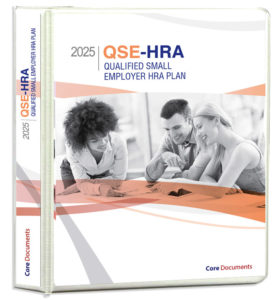Home / Blog / How to administer QSEHRA employees without health insurance
How to administer QSEHRA employees without health insurance
One of the most attractive features of a Qualifying Small Employer Health Reimbursement Arrangement (QSEHRA) is that employers with fewer than 50 full-time employees can provide funds to help those employees cover eligible health care expenses without having to pay for an expensive group health plan. However, since the 21st Century Cures Act that establishes the QSEHRA into law coordinates its rules with the Affordable Care Act (ACA), employers must guard against making QSEHRA reimbursement to employees without health insurance.

No employer group health plan, but . . .
Eligibility requirements for an employer to provide a QSEHRA to employees state that the employer must not have a group health plan available to active employees (ref. IRS Notice 2017-67, Topic A).
However, this does not mean that health insurance is not required before the employer makes a QSEHRA reimbursement.
For an employee to be eligible to receive QSEHRA reimbursement for qualifying medical expenses, the employee must bring his or her own health insurance to the plan.
The employee’s health insurance can be a plan they were under before the employer provided the QSEHRA. They may pay for it on the individual market or through the Health Insurance Marketplace. The employee may be covered under a spouse’s or parent’s health plan. Or, the employee may purchase a new health insurance plan and then be reimbursed for the premium from the employer’s QSE-HRA.
Proof of MEC required
For the employer’s part, evidence of coverage under a health plan that meets minimum essential coverage (MEC) requirements has to be on file for every employee (and eligible dependents, if applicable) before the first QSEHRA reimbursement of a plan year.
Attestation of continued coverage is required for every reimbursement made to that later in the plan year.
Until the employer receives the required proof of MEC from an employee, the employer cannot reimburse the employee from the QSE-HRA.
Payment is reimbursed, not advanced
As mentioned earlier, some employees will purchase their MEC health plan for the first time with newly available QSEHRA funds in mind.
The employer has to make sure employees understand that a QSEHRA does not give an employee funds to go out and buy health insurance. It is a Qualified Small Employer Health Reimbursement Arrangement.
When an employee intends to purchase health coverage using funds available in a QSEHRA, the employee must first pay the premium and then submit proof of MEC along with receipt(s) documenting the premium paid. Then, the employer may reimburse the employee for the premium (up to the limits of the plan). To do otherwise means the employer is giving QSE-HRA reimbursement to employees without health insurance, which is not permitted.
No reimbursement on a taxable basis
When the QSEHRA came into law, the IRS issued only bare-bones guidance. At first, it sounded as if the QSEHRA could reimburse an employee without health insurance coverage for eligible medical expenses on a taxable basis with the reimbursements reported on their W-2 forms as taxable wages.
However, final IRS guidance (see below) prohibits making taxable QSEHRA reimbursement to employees without health insurance.
There are no exceptions to this rule.
IRS Text on QSEHRA reimbursement to employees without health insurance, from IRS Notice 2017-67, pp. 28-29 states:
Question 43: May a QSEHRA reimburse an eligible employee on a taxable basis if the employee fails to provide proof of MEC for the individual for whom the employee seeks payments or reimbursements?
Answer 43: No.
Why is it this way?
Some small employers have come to us frustrated that the law governing QSEHRA plans does not permit making QSE-HRA payments to employees who do not buy health insurance. They believe it could be far more helpful to employees, which is the employer’s goal, without that restriction. And, they’re right.
The reason for the proof of MEC requirement is that the Cures Act is written in accordance with the ACA and its coverage mandates. Small employers are exempt from the ACA employer group plan mandate, but Congress cannot allow employers of any size to provide funds for health care expenses without first requiring ACA-approved insurance coverage. To impose that requirement, the law uses the ACA individual mandate instead.
You are probably aware that the 2017 Tax Cuts and Jobs Acts removes the penalty for violating the individual mandate beginning in 2019, effectively killing it. While this may be the effect of the 2017 tax law, it is not the fact of ACA law. The ACA’s individual mandate itself remains firmly entrenched in the law and is written into the regulations governing the QSEHRA.
Until Congress acts to remove the ACA individual mandate from the law altogether — through repeal of the entire ACA or at least a proper repeal of its mandate provision — QSEHRA rules prohibit making reimbursements to employees who do not buy health insurance.
Video: QSEHRA — The Stand-Alone HRA Returns!
04:00 Minute Executive Summary:
PDF Brochure –Core QSEHRA Qualified Small Employer HRA Plan Document (with forms)


QSEHRA Plan Document Package

Our friendly and knowledgeable staff is available to
answer any questions you may have via e-mail or phone call,
Monday through Friday, 9 am to 5 pm ET:
1-888-755-3373
No annual fee — Core Documents does not require an annual renewal fee to maintain your plan document package. A plan document only needs to be updated when there are changes in the plan or in the law that make it necessary. We will notify you when there are sufficient changes in the Code to require amending and restating your Plan and ask that you keep us informed when there is a change to your plan. You can amend and update your plan document anytime, at a discounted fee and only when necessary, which is the most cost-effective way to maintain it.
*Fast Service — Most orders placed by 3 PM are returned via email the same day, Monday through Friday. Weekend orders are sent out Monday morning. Plan document packages are processed in the order received. During our busiest months (December, January, and February), the rush order fee (see order form) marks your document to be processed immediately.
Refund Policy: Goods and services provided by Core Documents, Inc. are non-refundable upon receipt. Orders cancelled prior to shipping are subject to a fee to cover the cost of goods and services provided during the review, draft, and preparation of your order.
The Trusted Source of Affordable Benefit Plan Documents for over 27 Years.
Core Documents is the country’s leading provider of cost-effective, tax-saving benefit plan documents for Section 125 Cafeteria plans and Health Reimbursement Arrangements. The Trusted Source since 1997, thousands of satisfied agents and employer groups nationwide rely upon Core Documents for free plan design consulting services, plan document updates, ERISA Wrap SPDs, and administration services.